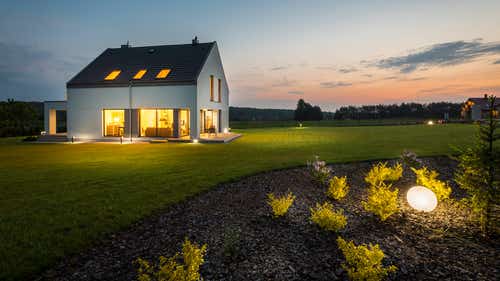- Uswitch.com>
- Gas and Electricity>
- Guides>
- Which energy suppliers are British-owned? - Uswitch
Which energy suppliers are British?
It might surprise you to learn which of the big six suppliers are owned and operated by foreign companies. Below you’ll find a breakdown of where each big six company’s ownership lies. However, most of the energy consumed in the UK is imported from other countries, so it's unlikely that 100% of your energy is British, even if the supplier is British-owned-and-operated.
Which big energy suppliers are British?
British Gas
As its name suggests, British Gas is indeed British-owned. British Gas is the oldest energy company in the UK, having been founded in 1812 as the Gas Light and Coke Company (GLCC) before taking the name British Gas in 1973. Centrica, British Gas’ parent company, is a multinational utility company based in Windsor, Berkshire.
OVO Energy
OVO, which has risen to become one of the UK's biggest energy suppliers following its acquisition of SSE's domestic energy customer base, is based in Bristol.
Octopus Energy
Although Octopus is increasingly operating on a global scale, it remains a British company, with its headquarters in London.
What about EDF, E.ON Next and ScottishPower?
EDF Energy
EDF Energy was formed after French energy company Electricite de France purchased London Energy. Therefore, EDF Energy is owned by the French state. It is also one of the largest distribution network operators in the UK after taking control of the UK nuclear generator, British Energy.
ScottishPower
ScottishPower was formed in 1990 after the state-owned Scottish electricity industry became privatised. Its headquarters may be located in Glasgow but, since 2006, the supplier has been a subsidiary of Spanish utility company Iberdrola.
E.ON Next
Founded in 1989 as Powergen, E.ON Next's headquarters are located in Coventry. However, E.ON is a German company - it acquired Powergen in 2002, at which time the supplier's name was changed to E.ON (and is now E.ON Next).
Where does my energy come from?
In recent years, the UK has imported more of its energy supply than it exports from other countries. Approximately 60% of the UK energy supply comes from abroad: from countries including Norway, Qatar, Sweden and the Netherlands, among many more. Around 60% of the UK's natural gas imports come from Norway, and 30% of it comes from Qatar. Around half of the UK's crude oil imports come from Norway, and just over 30% comes from OPEC.OPEC is the Organisation of the Petroleum Exporting Countries and has 14 member states that all combine to coordinate international trade policies on petroleum and sell their products together. OPEC's members include Iraq, Iran, Venezuela, Saudi Arabia, Ecuador, Gabon and others mostly in the Middle East region.
This trend of importing more energy than exporting isn't just happening in the UK though. All EU countries now import more energy than they export.
Why don't we get more energy from within the UK?
There has been a decline in gas and oil production in the North Sea, so the UK has been getting more and more of its energy from other countries. Despite the UK using less energy and increasing its use of renewable sources, our dependence on imported energy has returned to levels not seen since the 1970s. However, this is also a result of the UK's shift away from fossil fuels and to cleaner energy sources. The UK has been investing less in fossil fuel production and more on renewables.
Is the UK using less energy than before?
Yes, the general trend shows that the UK as a whole is consuming less energy than in recent times. From the period between 1998 and 2015, there was a 17% fall in the UK's energy consumption and, despite there being a steady increase in the UK population, the amount of energy being consumed continues to fall. Ofgem has even changed its Typical Domestic Consumption Values (which are used to help calculate the level of the energy price cap) to reflect lower energy use across the UK.
There are a few reasons why this is happening:
More households increasing their energy efficiency through the use of more energy-efficient appliances, better insulation and other measures.
Government policies have been focused on reducing energy consumption and have put regulations and restrictions in place on how much energy businesses and products can consume. There have also been measures and investments to support the promotion of energy saving technology.
The cost-of-living crisis which began with the collapse of the energy market in the autumn of 2021, leading to high energy prices and prompting consumers to use as little as safely possible.
Want to learn more about energy suppliers?
Thirsty for more energy knowledge? Find out more about all suppliers, including pricing history, independent customer reviews and more information about the big six and independent energy providers in our energy suppliers guides.
Read more:

Who supplies my gas or electricity? - Uswitch
Find out who your gas or electricity supplier is and which energy plan you are on with our step-by-step guide.
Learn more
Can I switch energy supplier if I have solar panels? - Uswitch
Find out if having solar panels will make it more difficult for you to switch energy supplier.
Learn more
Tenants’ guide to switching energy and electricity supplier - Uswitch
Discover if you can or cannot compare and switch energy providers without your landlord’s permission. More than three-quarters of UK renters are missing out of hundreds of pounds worth of energy savings by not comparing and switching their energy supplier.
Learn more
